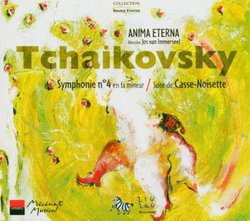| All Artists: Pyotr Il'yich Tchaikovsky, Jos van Immerseel, Anima Eterna Orchestra Title: Tchaikovsky: Symphonie No. 4; Suite de Casse-Noisette Members Wishing: 0 Total Copies: 0 Label: Zig Zag Territories Release Date: 9/9/2003 Album Type: Import Genre: Classical Style: Symphonies Number of Discs: 1 SwapaCD Credits: 1 UPC: 3760009290297 |
Search - Pyotr Il'yich Tchaikovsky, Jos van Immerseel, Anima Eterna Orchestra :: Tchaikovsky: Symphonie No. 4; Suite de Casse-Noisette
 | Pyotr Il'yich Tchaikovsky, Jos van Immerseel, Anima Eterna Orchestra Tchaikovsky: Symphonie No. 4; Suite de Casse-Noisette Genre: Classical
|
Larger Image |
CD Details |
CD ReviewsThe first Tchaikovsky recording with period instruments Larry VanDeSande | Mason, Michigan United States | 11/11/2005 (3 out of 5 stars) "When American Record Guide reviewed this the reviewer began saying, "Tchaikovsky on period instruments. It had to happen." Yes, it had to happen. Fortunately the result is more than tolerable and may help people dedicated to PPP become a new audience for Tchaikovsky. Noted fortepianist Jos van Immerseel -- whom most collectors know from his piano trio work with cellist Anner Bylsma and violinist Vera Beths -- is the conductor. I consulted a Web site that suggested he is a well-known conductor in the Baroque and Classic repertoire and has an established working relationship with L'Archibelli, a period performance group. He established Anima Eterna, the group that performs here, in 1987. According to the notes that accompany this issue, Anima Eterna is interested in "historically accurate instrumentation" and not period performance practice. Where the differences lie between the two is the difference between instrumentation in the late Romantic period and today. Take away flugelhorns and a few other instruments invented this century and there isn't much difference. That's the reason you won't hear much difference on this CD. This group plays a remarkably straightforward performance of the symphony that is equal, perhaps slightly ahead of, the last recording I heard by Gergiev and the Vienna Philharmonic Orchestra. This recording is a little better than that one, too. There is little difference between this and the last version of the symphony you heard, although the clear recording allows you to hear everything. The authentic instrumentation sounds little different from what I am used to. I don't know what timpani was like in Tchaikovsky's day but the sticks and drums used here are not prevalent in the big moments of the finale. I hear them fine other times, meaning this is probably more of the conductor's work than the recording or instrumentation. The inimitable "Nutcracker" suite fills out the CD, whose total time pushes 72 minutes. There is more clarity in the instrumentation during the dance sections where you can begin to hear differences in instrumentation from what you're used to. And either the clarity of the recording makes the performers sound better...or they are simply playing better. There are other characteristic differences here than in the the symphony. The attention to orchetral detail and clear recording allows rattles and other instruments greater discourse than is the norm in this music. The Russian dance, Trepak, is rhythmically alive and will get you tapping your toe. The woodwinds are exceptional throughout and steal the show in the two final dance sequences and the concluding waltz. All things considered I'd say the "Nutcracker" is the main course with the great "Fate" symphony serving as either a wonderful appetizer or a delicious dessert served ahead of your meal." A clear and beautiful approach David J. Trainer | Sydney, Australia | 04/17/2008 (5 out of 5 stars) "Now this symphony has the ability to raise the hairs on my neck if it's played with passion and excitment. I own a fabulous recording that does this with the "Philharmonia of the Nations".
Finally, there is a "period instrument" orchestra which plays with the same passion and virve, but with attention to detail and phrasing supposedly more close to Tchaikovsky's intentions. The first movement, in particular is wonderful. The descending horns scales during the climaxes are thrilling, the string playing is crisp and vital, great stuff. The Nuctcracker, is also very good, shame they didn't recording the whole lot." |

 Track Listings (12) - Disc #1
Track Listings (12) - Disc #1